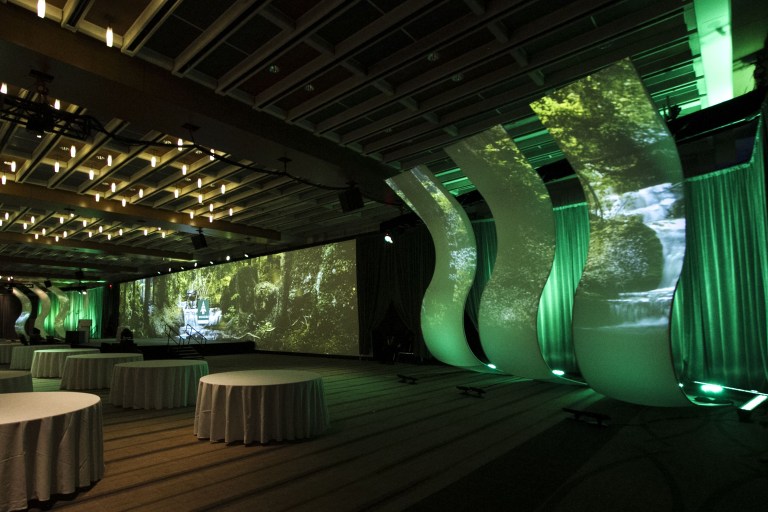Eco-Friendly Tech for Large-Scale Entertainment Events sets the stage for this enthralling narrative, offering readers a glimpse into a story that is rich in detail and brimming with originality. From identifying eco-friendly solutions to exploring energy-efficient lighting and waste management systems, this article delves into the innovative technologies shaping the future of event production.
As we navigate through the realms of sustainable tech and its impact on large-scale entertainment events, a world of possibilities unfolds, promising a greener and more eco-conscious approach to event planning and execution.
Eco-Friendly Tech Solutions
Large-scale entertainment events can greatly benefit from the implementation of eco-friendly technologies. These sustainable solutions not only help reduce the environmental impact of such events but also promote a greener and more responsible approach to event production.
Solar-Powered Stage Equipment
One eco-friendly technology suitable for large-scale entertainment events is the use of solar-powered stage equipment. By harnessing the power of the sun, stages can be powered without relying on traditional electricity sources, reducing carbon emissions and energy consumption.
LED Lighting Systems
LED lighting systems are another eco-friendly solution that can be implemented in large-scale entertainment events. Compared to traditional lighting, LED lights are more energy-efficient, have a longer lifespan, and do not contain toxic materials such as mercury.
Biodegradable Event Materials
Using biodegradable event materials, such as compostable cups, plates, and utensils, can significantly reduce the amount of waste generated during large events. These materials break down naturally, minimizing the environmental impact of the event.
Energy-Efficient Lighting

When it comes to large-scale entertainment events, choosing energy-efficient lighting options is crucial to reduce electricity consumption and minimize environmental impact.
LED Lighting
LED lighting is a popular choice for events due to its energy efficiency. Compared to traditional incandescent bulbs, LEDs consume up to 75% less energy and have a longer lifespan, reducing the need for frequent replacements.
- LED lights produce less heat, making them safer to use and reducing the load on cooling systems in event venues.
- They are available in a variety of colors and can be easily dimmed or programmed for dynamic lighting effects, enhancing the overall ambiance of the event.
Smart Lighting Systems
Smart lighting systems offer advanced controls and automation features to optimize energy usage during events.
- These systems can adjust lighting levels based on natural light conditions, occupancy sensors, and scheduling, ensuring that lights are only used when needed.
- Integration with motion sensors and smart devices allows for real-time monitoring and adjustments, further reducing energy waste.
Waste Management Systems

When it comes to large entertainment events, waste management systems play a crucial role in ensuring environmental sustainability and reducing the carbon footprint of the event. Implementing effective waste management strategies can help minimize the amount of waste generated and divert a significant portion of waste from landfills through recycling and composting.
Waste Management Strategies
One key strategy for reducing waste generation during events is to implement a comprehensive waste management plan that includes waste audits, waste segregation stations, and clear signage to guide attendees on proper waste disposal. By encouraging attendees to separate recyclables, compostables, and landfill waste, event organizers can significantly reduce the amount of waste sent to landfills.
Another effective way to minimize waste generation is to work with vendors and suppliers who prioritize sustainable packaging and products. By opting for compostable or recyclable materials, such as biodegradable food containers and paper straws, event organizers can reduce the environmental impact of the event.
Moreover, implementing a food donation program can help prevent excess food waste by redistributing surplus food to local charities or shelters. This not only reduces waste but also supports communities in need.
Recycling and Composting Importance
Recycling and composting are essential components of event waste management as they help divert waste from landfills and reduce greenhouse gas emissions. Recycling materials such as plastic, glass, metal, and paper conserves natural resources and reduces energy consumption associated with manufacturing new products.
Composting organic waste, including food scraps and biodegradable materials, helps create nutrient-rich soil that can be used for landscaping or agricultural purposes. By diverting organic waste from landfills, event organizers can reduce methane emissions, a potent greenhouse gas that contributes to climate change.
Transportation Solutions

When it comes to organizing large-scale entertainment events, transportation plays a crucial role in determining the overall carbon footprint of the event. From event attendees to staff members, implementing eco-friendly transportation solutions can significantly reduce the environmental impact of the event.
Eco-Friendly Transportation Options
Implementing eco-friendly transportation options can help reduce emissions and promote sustainability. Some successful examples of sustainable transportation solutions at large events include:
- Providing shuttle services powered by electric or hybrid vehicles
- Promoting carpooling among attendees and staff
- Encouraging the use of public transportation by offering discounts or special deals
- Setting up bike-sharing stations near the event venue
Renewable Energy Sources
Renewable energy sources play a crucial role in powering large-scale entertainment events while reducing their carbon footprint. These sources, such as solar, wind, and hydro energy, offer sustainable alternatives to traditional fossil fuels.
Solar Energy
Solar energy is a popular choice for powering events due to its reliability and scalability. By utilizing solar panels, events can harness the power of the sun to generate electricity throughout the day. For instance, the Coachella Valley Music and Arts Festival in California installed a massive solar array to power its stages, reducing reliance on traditional energy sources.
Wind Energy
Wind energy is another renewable option for powering events, especially in locations with consistent wind patterns. By setting up wind turbines, events can generate electricity to meet their energy needs. The Glastonbury Festival in the UK incorporated wind turbines to supplement their energy requirements, showcasing the feasibility of wind power in event setups.
Hydro Energy
Hydro energy, derived from flowing water, can also be utilized to power large-scale events. Events held near water bodies can tap into hydroelectric power by installing turbines to convert water flow into electricity. The Bonnaroo Music and Arts Festival in Tennessee implemented a hydro energy system to reduce its environmental impact and promote sustainability.
Closure
In conclusion, Eco-Friendly Tech for Large-Scale Entertainment Events showcases the transformative power of sustainable technologies in shaping the landscape of event production. With a focus on eco-friendly solutions, energy-efficient practices, waste management systems, transportation solutions, and renewable energy sources, this article highlights the importance of embracing environmentally conscious approaches for a brighter and more sustainable future in the realm of entertainment events.
Top FAQs
Can eco-friendly tech really make a difference in large-scale entertainment events?
Yes, eco-friendly tech can significantly reduce the environmental impact of events by using sustainable practices and innovative technologies.
How can event organizers implement waste management systems effectively?
Event organizers can implement waste management systems effectively by strategizing to reduce waste generation, promoting recycling and composting, and engaging attendees in sustainable practices.
What are some examples of renewable energy sources that can power large-scale entertainment events?
Renewable energy sources such as solar, wind, and hydro energy can be utilized to power large-scale entertainment events, reducing reliance on fossil fuels and minimizing carbon emissions.










